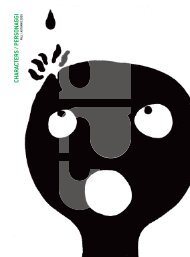F A B M A G A Z IN E / M A Y -J U N E 2 0 0 4 - fabrica
F A B M A G A Z IN E / M A Y -J U N E 2 0 0 4 - fabrica
F A B M A G A Z IN E / M A Y -J U N E 2 0 0 4 - fabrica
Create successful ePaper yourself
Turn your PDF publications into a flip-book with our unique Google optimized e-Paper software.
-----<br />
-----<br />
WHAT MUSIC SOLVED A PROBLEM <strong>IN</strong> YOUR LIFE?<br />
QUALE MUSICA TI HA AIUTATO A RISOLVERE UN<br />
PROBLEMA NELLA VITA?<br />
RAPHAEL CAMENISCH 5<br />
First I have to ask myself: Is music able to solve problems at all? I don’t really think so. I see music more as a midwife<br />
for the soul.<br />
Music can release your feelings, music can give them a shape, a voice but it still doesn’t solve problems. Music is an<br />
intensifier for feelings.<br />
You can ask to what extent intensified feelings stimulate your thoughts, and thus indirectly solve problems. But, yet,<br />
this is not my case.<br />
I remember for example listening to Brahms third symphony (op. 90), third movement every time I felt blue, or<br />
lovelorn. Listening to it, the music was not a solution to my problems, it was an amplification of my problems. It was a<br />
way of yielding to the pain, to the longing. You let yourself go with the music and your feelings. And maybe it becomes<br />
a way to see the situation in a different light.<br />
I was in that three-person relationship over half a year, where we all thought there could be a solution. In the end it<br />
broke up dramatically. That was one of the occasions for me to listen to Brahms.<br />
-----------------------------------------------------------------------------------------------------------------------<br />
Prima di rispondere dovrei chiedermi: la musica è davvero in grado di risolvere i problemi?<br />
Secondo me, no. Vedo la musica piuttosto come una levatrice per l’anima.<br />
La musica può far nascere dei sentimenti, può dare loro forma e voce, però non risolve i problemi. La musica<br />
intensifica i tuoi sentimenti.<br />
Potresti chiedermi fino a che punto questi sentimenti “intensificati” possano stimolare i tuoi pensieri e quindi,<br />
indirettamente, risolvere i problemi. Ma non è questo il mio caso.<br />
Mi ricordo ad esempio di aver ascoltato la terza sinfonia di Brahms (op. 90), terzo movimento, ogni volta che mi sentivo<br />
giù e col cuore a pezzi. Ascoltando quel brano, la musica non risolveva i miei problemi, ma li amplificava. Era un modo<br />
per abbandonarsi al dolore, al rimpianto. Per lasciarsi andare ai propri sentimenti. Forse diventa un modo per vedere<br />
la situazione in una luce diversa.<br />
Mi sono ritrovato a vivere una specie di relazione a tre per più di un anno, e pensavamo tutti che la cosa potesse<br />
funzionare. Alla fine, la rottura fu tragica. Ecco, questa fu una di quelle occasioni in cui ho ascoltato Brahms.<br />
THIRD SYMPHONY BY JOHANNES BRAHMS (OP. 90). 6<br />
VIENNA PHILHARMONIC ORCHESTRA<br />
CONDUCTED BY LEONARD BERNSTE<strong>IN</strong> / DIRETTA DA LEONARD BERNSTE<strong>IN</strong><br />
####################################################################################################################<br />
###########################################################################<br />
5<br />
Swiss, Music Department / 6 "His name is Johannes Brahms, and he has all the signs which declare: he is one of the chosen…As soon he sits at the pianoforte he takes us to<br />
wonderful places …We salute his entrance into this world that will no doubt open wounds, but will also bring laurel and palm leaves”. These words were written by Robert<br />
Schumann in "Neue Zeitschrift für Musik" 23 October 1853. Robert and Clara Schumann were good friends of young Johannes until the situation became complicated: Brahms fell<br />
madly in love with Clara who was his elder by fourteen years. The relationship between the two brought young Brahms only insecurity and pain, just as Schumann had predicted.<br />
Schumann soon fell ill, Clara distanced herself from Brahms and their dreams never came to fruition.<br />
5<br />
Svizzero, Dipartimento di Musica / 6 "Si chiama Johannes Brahms e possiede tutti i segni precursori: è uno degli eletti… Non appena si siede al pianoforte ci trasporta in luoghi<br />
meravigliosi… Rendiamo omaggio al suo arrivo in questo mondo che sarà indubbiamente foriero di pene, ma anche di palme e di allori”. Queste parole furono scritte da Robert<br />
Schumann in "Neue Zeitschrift für Musik" il 23 ottobre 1853. Robert e Clara Schumann diventarono buoni amici del giovane Johannes finché la situazione non si complicò: Brahms<br />
si innamorò perdutamente di Clara che aveva quattordici anni più di lui. La relazione fra i due causò al giovane Brahms soltanto insicurezza e dolore, proprio come aveva predetto<br />
Schumann. Schumann presto si ammalò, Clara si allontanò da Brahms e i loro sogni non si realizzarono mai.<br />
70 / 71










